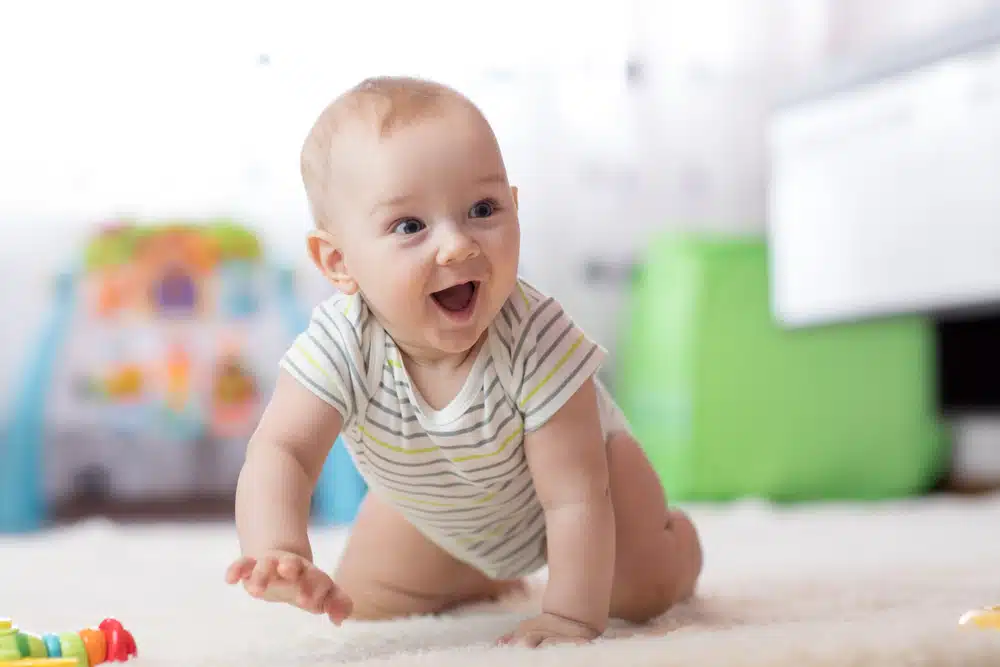Baby crawling is a remarkable developmental milestone that marks a significant step in a child’s growth. It is an exciting time for both parents and babies as they witness the little one venture into the world of exploration and discovery. Crawling is more than just a means of getting around; it plays a crucial role in a baby’s overall development.
What is Baby Crawling?
Baby crawling refers to the act of moving on all fours, typically using their hands and knees, to explore their surroundings. It is a natural developmental stage that occurs after the baby has mastered holding their head up and is usually one of the first forms of independent movement.
The Developmental Significance of Crawling
Baby crawling has profound effects on various aspects of a child’s development, including physical, cognitive, emotional, and social.
- Physical Development
During crawling, babies engage multiple muscle groups, including arms, legs, and core. This helps in strengthening their muscles and improving their overall motor skills. The repeated movements of crawling contribute to the development of coordination and balance.
- Cognitive Development
Crawling is not only a physical activity but also a cognitive one. As babies move around their environment, they gain a better understanding of spatial relationships and learn to navigate obstacles. This experience fosters cognitive development and problem-solving skills.
- Emotional Development
Crawling provides babies with a sense of independence and self-confidence. As they explore their surroundings, they become more confident in their abilities and develop a sense of curiosity about the world.
- Social Development
Crawling often leads to social interactions as babies interact with their caregivers or other babies. These interactions contribute to emotional development as babies learn to express themselves and develop attachments.
How to Encourage Crawling
Encouraging crawling in babies involves creating a supportive environment and providing the right stimuli.
- Tummy Time
Tummy time is an essential exercise that helps babies develop neck, shoulder, and arm muscles. Regular tummy time sessions prepare them for crawling by building the necessary upper body strength.
- Creating a Safe Environment
Ensure the crawling area is safe and free from potential hazards. Remove any sharp objects or small items that could be swallowed.
- Using Motivating Toys
Placing enticing toys just out of reach can motivate babies to move towards them. This will encourage them to crawl and explore their environment.
- Encouraging with Your Presence
Sit a short distance away from your baby and call them towards you. Your encouraging voice and smile will motivate them to crawl towards you.
- Supportive Furniture
Low furniture or cushions can be used to create a crawling-friendly environment. This allows babies to pull themselves up and practice crawling along the furniture.
- Limiting the Use of Baby Walkers
Baby walkers can hinder the development of crawling. Limit their use and focus on encouraging natural crawling movements.
Read also: How to keep Floors Clean for Crawling Baby – Quick Guide
When Do Babies Start Crawling?
The age at which babies start crawling can vary. Some babies may begin as early as six months, while others may take until ten months or more. Each baby is unique, and there is no need to worry if your baby hasn’t started crawling by a specific age.
Common Concerns about Baby Crawling
Parents often have concerns or questions about their baby’s crawling journey.
- Baby Prefers Scooting Instead of Crawling
It is entirely normal for babies to find their unique way of getting around. Some babies may prefer scooting on their bottoms or rolling to crawling.
- Baby Crawling Backwards
Crawling backward is a common stage in a baby’s crawling journey. It is a part of the process as they learn to coordinate their movements.
- Baby Skips Crawling and Goes Straight to Walking
While crawling is an essential stage in a baby’s development, some babies may skip it altogether and go straight to walking.
- Baby Doesn’t Show Interest in Crawling
If your baby seems uninterested in crawling, try providing enticing toys or using a playmate to encourage movement.
- Ensuring Baby’s Safety During Crawling
To ensure your baby’s safety during crawling, always supervise them closely and create a safe environment free of potential hazards.
- The Joy of Watching Your Baby Crawl
As a parent, watching your baby crawl is a moment of immense joy and pride. It is a testament to their growth and development.
Conclusion
Baby crawling is a crucial milestone in a child’s life that holds significant developmental benefits. It fosters physical, cognitive, emotional, and social development, shaping a strong foundation for future growth. As parents, providing a supportive and safe environment for your baby’s crawling journey is essential. Embrace the joy of watching your little one explore the world around them, and celebrate each milestone they achieve.
FAQs
- How can I encourage my baby to crawl?
You can encourage crawling by providing tummy time, using motivating toys, and creating a safe and supportive environment.
- Is it normal if my baby skips crawling?
Yes, it is normal. Some babies may skip crawling and go straight to walking, and that’s perfectly fine.
- What if my baby prefers scooting?
Scooting is a common way for babies to explore. It is entirely normal and helps build their muscles and coordination.
- How can I create a safe environment for crawling?
Baby-proof the crawling area by removing potential hazards and sharp objects.
- When should I be concerned about my baby not crawling?
If your baby hasn’t started crawling by around ten to twelve months, consider discussing it with a pediatrician to rule out any developmental concerns.
Read Also: When Can Baby Play With Sand (In Sandbox or at Beach!)








